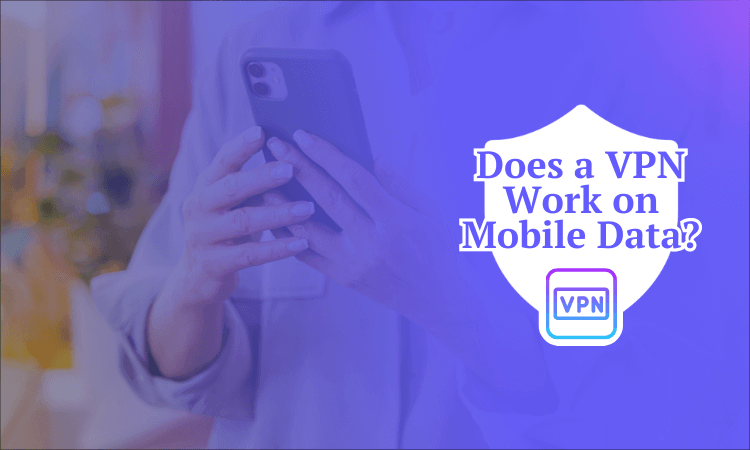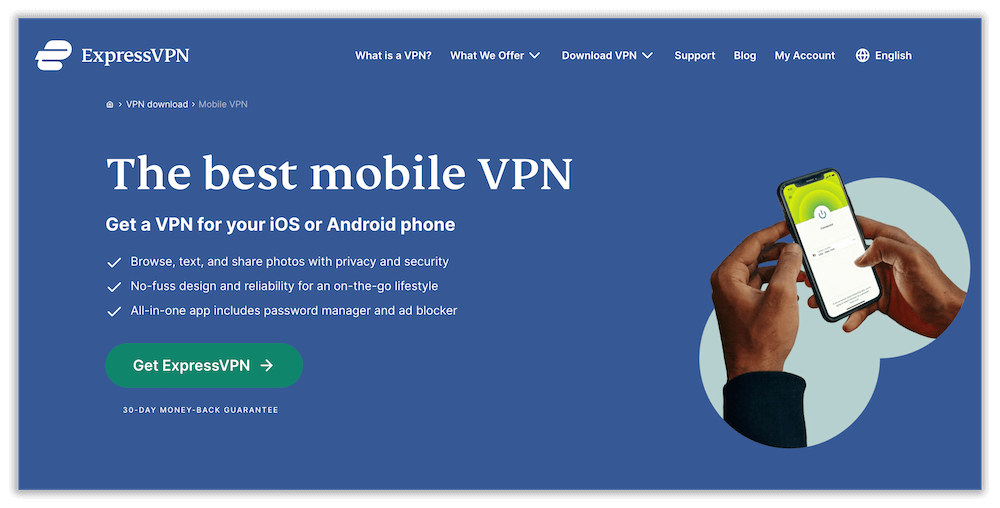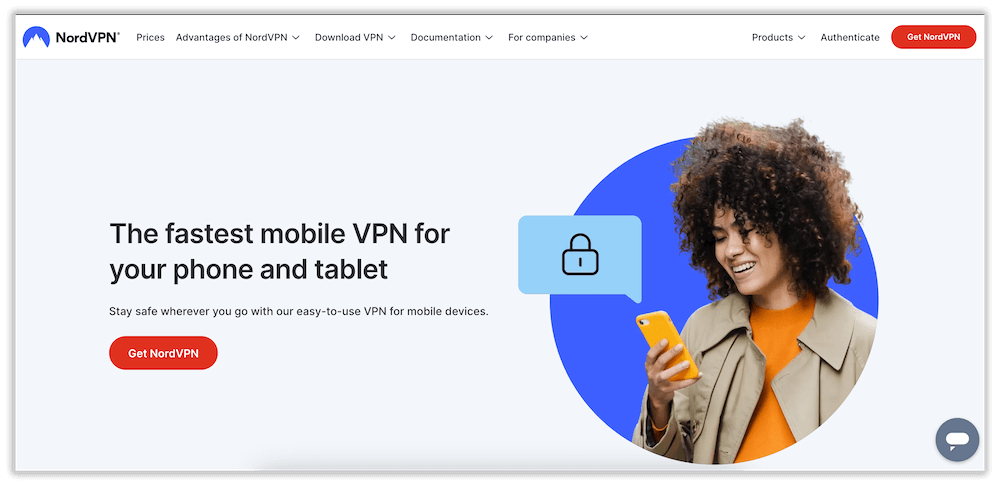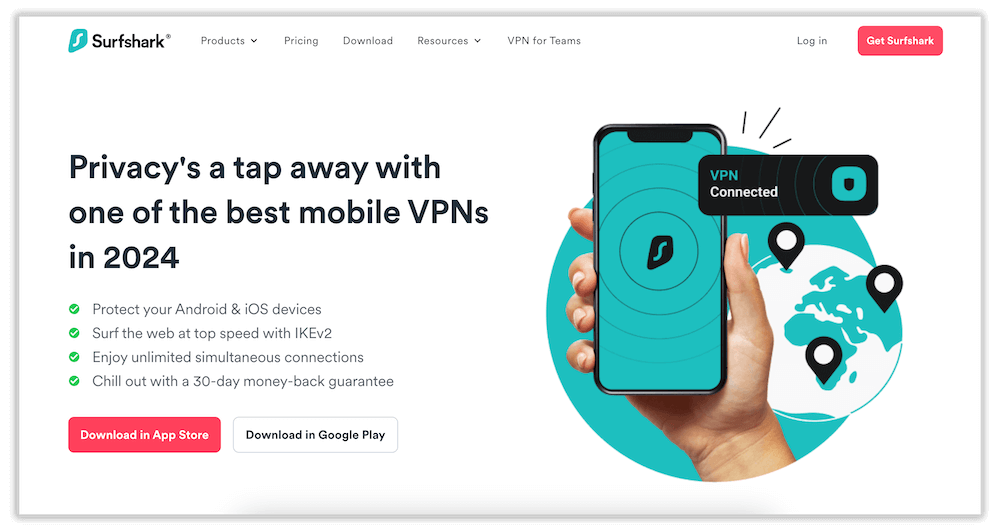
Does a VPN Work on Mobile Data? Guide for 2025
Quick Answer: Does a VPN Work on Mobile Data?
A VPN can work on mobile data — it functions just like any other internet connection. I highly recommend using a VPN on any connection, as it offers security, privacy and access to geo-restricted content.
As of 2024, there are billions of unique mobile subscribers worldwide — that’s more users than any other internet-enabled device has. Mobile users frequently use data instead of WiFi to access the internet. For those who are conscious of their privacy, this raises an important question: Does a VPN work on mobile data? And can any of our best VPNs do the trick?
The short answer is yes, a VPN works on mobile data, and I strongly recommend using one for several reasons. For one, it stops your internet service provider (ISP) from seeing the sites you access. It also protects you against online threats like hacking, which is especially important if you have banking apps on your mobile device. I’ll explain it all in this article.
Does a VPN Work on Mobile Data?
A VPN works on mobile data. It functions just like any other internet connection by encrypting your online traffic. Each of our best VPN for mobile picks can protect mobile data connections and WiFi connections alike.
Does a VPN Work Without WiFi?
Yes, a VPN can work without WiFi. VPNs work with any internet connection type, and they’re not limited to WiFi connections. If you’re on mobile data, simply launch the VPN like you would on WiFi and connect to your preferred server to hide your activity.
How Does a VPN Work on a Phone’s Mobile Data?
If you’re using mobile data to access the internet, you can download a VPN from the Apple app store or the Google Play store. Once you log in, connect to any server. This will give you a new IP address so that no one — not even your ISP — can see anything you’re doing on the internet, letting you bypass ISP throttling and access geo-restricted content.
The most common encryption that VPNs use is 256-bit, which creates an encrypted tunnel that your traffic passes through when you access the internet. All the data transmitted to the internet is redirected to the VPN server instead of your device. No one else can see what you access, whether you’re using mobile data, WiFi or any other network.
Does a VPN Give You WiFi or Internet?
No, a VPN doesn’t give you WiFi or internet; it only routes your internet traffic through an encrypted tunnel to mask your online activities. For that to happen, you need an internet connection or a cellular data network.
Does Using a VPN Use More Data?
Yes, a VPN uses more data compared to regular internet traffic. It’s estimated that using a VPN on your mobile network increases data usage by 4-20%, but this depends on your VPN protocol. For instance, protocols using 128-bit encryption consume less data than 256-bit alternatives.
Do I Need a VPN on a Mobile Network?
You need a VPN on a mobile network for the following reasons:
- Staying anonymous: Your ISP can usually see all the web pages you visit. A VPN prevents that by encrypting your traffic, ensuring that no one can tell what you’re doing online.
- Maintaining security: Using mobile data to access your banking services is safer than using public hotspots. This is because data transferred through 4G, 5G or LTE is encrypted by default, while public hotspots are unsecured. Still, the VPN encryption provides an extra layer of almost foolproof security.
- Accessing restricted content: A VPN lets you bypass geographic restrictions on content by connecting to servers all around the world. You can use a VPN server’s IP address to access platforms like Hulu, Max or Disney Plus in other countries that have different libraries.
- Bypassing price discrimination: Online shopping platforms display different prices depending on your region. This also extends to discounts, and sometimes specific items are released in certain regions earlier than the rest. Connecting to a VPN on your cellular network lets you change your location to seek the best pricing deals.
Best VPNs to Use on Mobile Data
Most top premium VPNs are compatible with mobile devices, and you can download them from their respective app stores. Here are the three best VPNs to use on mobile data. For more recommendations, see our best VPN for iPhone and best VPN for Android articles.
1. ExpressVPN

- Over 3,000 servers in 105 countries
- Compatible with Android & iOS
- Fast speeds for streaming
- Expensive
ExpressVPN is the best VPN for mobile data. It’s one of the fastest alternatives around, whether you’re using WiFi or data. You can stream content without buffering, which is great if you love watching live sports on your phone. Thousands of optimized servers combined with the Lightway protocol are behind these amazing speeds.
Other features that make ExpressVPN an amazing mobile data VPN include a kill switch for IP and DNS leak protection, as well as RAM-only servers that never store your browsing data. ExpressVPN is one of the costlier VPNs around, but you can try ExpressVPN with its 30-day money-back guarantee. This ExpressVPN review explains the price plans in more detail.
2. NordVPN

- Fast speeds for streaming & gaming
- Dark web monitor for extra security
- Specialized security servers
- Obfuscated servers can be slow
NordVPN has over 6,000 servers in more than 100 countries that can unblock major streaming platforms like Hulu anywhere in the world, even when using mobile data. It’s fast enough for streaming and mobile gaming, particularly when you use the speed-optimized NordLynx protocol. It recently topped my colleague’s list of the best VPNs for PUBG mobile.
This VPN is a top option for security, as NordVPN offers standard AES 256-bit encryption. On top of this, you get a kill switch, a dark web monitor to keep track of your credentials on the deep web, and obfuscated servers for bypassing VPN blocks. You can also try NordVPN with its 30-day money-back guarantee. Read more in our NordVPN review.
3. Surfshark

- Unlimited simultaneous connections
- Affordable security suite plans
- Fast streaming speeds
- Some features (like dedicated IP) cost extra
- Expensive monthly plans
Surfshark is one of the few VPNsto allow unlimited simultaneous device connections. With this, you can connect as many phones for your friends and family as you want on the same account at no extra cost. Surfshark is also very fast, with over 3,200 servers in 100 countries, each capable of unblocking content while masking your online activities.
However, Surfshark is more than a VPN; it has pivoted to become more of a security suite app. Some reliable security and privacy features that are vital for your mobile connection include a kill switch for IP leak protection, and an ad and tracker blocker called CleanWeb. There’s also Dynamic MultiHop, which routes your traffic through two server locations simultaneously for a safer connection.
Surfshark for Android even has a free GPS spoofing feature for changing your mobile location so it doesn’t get exploited. You can also try Surfshark with its 30-day money-back guarantee. This Surfshark review offers more details.
Errors & Troubleshooting: Mobile VPN Connection
You may encounter connection issues when using your VPN with your mobile data. Here are some troubleshooting steps you can follow to deal with the errors.
How to Minimize VPN Data Usage
Using a VPN will increase your moible data usage. If you aren’t on a plan with unlimited mobile data, you can set your VPN to reduce data usage in the following ways.
1. Choose a VPN Protocol That Uses Less Data
The two most common types of encryption that major VPN protocols employ are 128-bit, which uses the least mobile data but is slightly less secure, and 256-bit, which uses more mobile data but provides better security. Always check the type of encryption offered before settling on the best mobile VPN. The table below illustrates these points.
| VPN Protocol | Mobile Data Consumption | Security Level |
|---|---|---|
| 128-bit PPTP | Low | Low |
| 128-bit L2TP/IPsec | Low | Moderate |
| 128-bit OpenVPN | Low | Moderate |
| 128-bit Stealth OpenVPN | High | Moderate |
| 256-bit L2TP/IPsec | Moderate | High |
| 256-bit OpenVPN | Moderate | High |
| 256-bit Stealth OpenVPN | High | High |
2. Use Split Tunneling
Split tunneling is a handy feature that lets you choose which apps and websites to route through the VPN service and which to leave out. This allows you to exclude data-heavy apps and sites while protecting apps or websites that use very little mobile data. However, take care never to leave sensitive activities like torrenting unprotected.
3. Turn Off the VPN When You’re Away From Your Phone
While it’s a good idea to keep your VPN on whenever you’re actually using the internet, pausing it when you don’t need it will conserve mobile data. However, if you have unlimited data, I recommend keeping the VPN active.
4. Activate Data Compression
Data compression is a process in which data is encoded to reduce its size and make it easier to transfer. When using a VPN on your cellular data, you can activate data compression in different ways depending on your device. Here are the instructions for compressing data on Android, Google Chrome and iOS.
5. Avoid Free VPNs
Some free VPNs generate revenue by selling your data to the highest bidder. Many of them also come jam-packed with annoying ads that interrupt your sessions while using even more of your data. There are many amazing free VPNs — our best free VPN article shares the top performers — but I recommend sticking to premium VPNs if you have the budget.
Why Does My VPN Not Work on Mobile Data?
If your VPN doesn’t work on mobile data, the following potential issues may have arisen.
- Internet connection problems: A VPN can’t connect without a working mobile data network. This can happen if you go out of range or if the entire mobile network is experiencing an issue. If you think you’re in range, try restarting your device; if that doesn’t fix it, your mobile carrier is probably having problems.
- Engaged kill switch: A VPN’s kill switch is a very effective tool for protecting your anonymity, but it can go too far by shutting down your internet due to unstable connections that keep forcing the VPN to drop. Try disabling the kill switch until the internet connection is stable enough, and then re-enable it.
- Outdated VPN app: An outdated VPN app lacks fixes for bugs that can stop the VPN from connecting successfully when you’re on mobile networks. Most VPNs are set to update automatically, but if that’s not the case with yours, check to see if you can download a new app update.
- Server downtime: You may have connected to a problematic VPN server that’s congested or otherwise broken. This is often the case when the VPN keeps loading without completing the connection. Try switching to another server.
Why Is My VPN Not Working on My Phone?
Sometimes, the connection issue may not be with the VPN but with your device instead. Here are the potential problems you may experience alongside their possible fixes.
- Charge your device: When your battery is low and you switch to power-saving mode, background activities vital to the VPN’s operation may be throttled, leading to connection problems. The best way around this is to charge your device.
- Restart your phone: Running your device for too long without a reboot leads to a build-up of cache and other residual files that can affect the overall performance. Restarting your phone clears your caches, giving your device a fresh start by removing any network bugs.
- Deactivate mobile firewalls: If you have another security app other than a VPN, like a mobile antivirus or firewall, deactivate it when using the VPN. These apps can conflict with VPNs and cause connection issues.
Conclusion
A VPN can work on mobile data, and I highly recommend using one. It will protect you against hackers and snooping from your ISP and government agencies. A VPN lets you change your location easily, so you can access geo-restricted content on your mobile device from anywhere in the world.
If you have used a VPN on your smartphone or tablet to access the internet through mobile data, how was the experience? Were there any significant changes compared to using regular connections? Let us know your thoughts in the comments below. We appreciate your continued readership of our blog.
FAQ: Using a VPN With Cellular Data
Does a VPN Work on Mobile?
Yes, a VPN works on mobile. You only need a working internet connection and a VPN subscription to encrypt your traffic and access geo-restricted content.Does a VPN Work Without WiFi?
Yes, a VPN can work without WiFi if you have another way to access the internet, like through mobile data.Can You Be Tracked With a VPN on Mobile Data?
You can’t be tracked with a VPN on mobile data. Once a VPN passes your regular traffic through an encrypted channel, it hides everything using high-level cryptography that can’t be cracked or accessed without the deciphering keys.

Leave a Reply